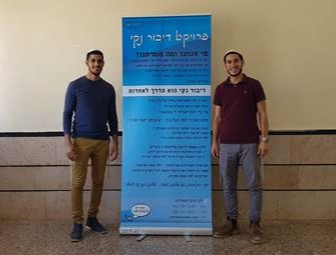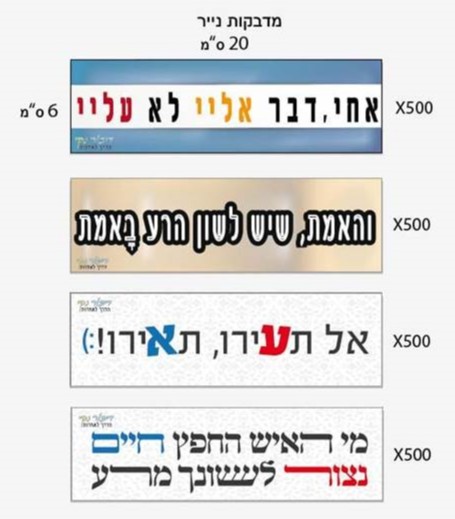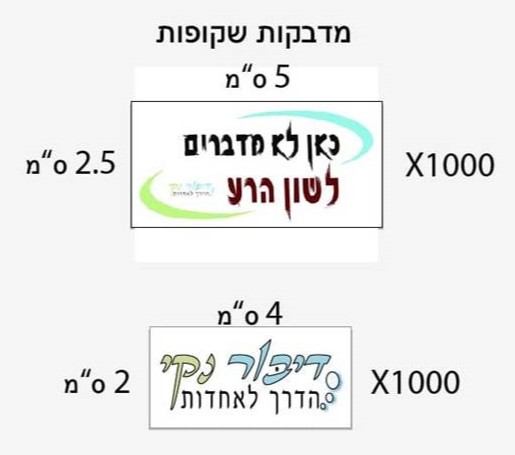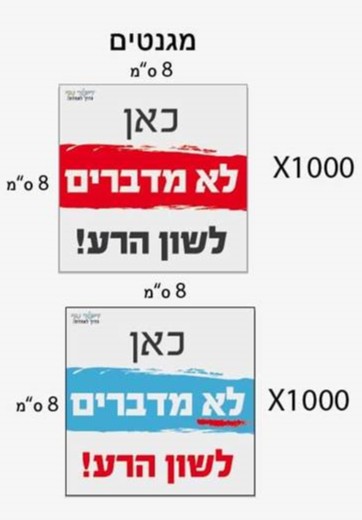"Israel's Peace Initiative": The Huge Project to Brighten the Nation on the 24th of Elul
"Don't stir, enlighten"; "Brother, talk to me, not about me." These are the slogans you'll encounter at key intersections throughout the country. Ohad Aharon and Roy Tesler, founders of the "Clean Talk – The Path to Unity" initiative, discuss the special day of activities that will be spread across the nation to raise awareness of the harms of harmful speech. Israel's peace initiative is underway. Expect to meet them at intersections.

Masmiya Junction. A young man stands under the scorching sun next to a booth, to his right a giant roll-up banner that brightly proclaims the words "Clean Talk - The Path to Unity." On the makeshift table, informational materials, stickers, car air fresheners, and booklets are perfectly organized. And these are, more or less, the voices heard:
"Hey brother, what's happening? How are you?" – the activist addresses him.
"Take this, a car air freshener, and a sticker for your bumper."
"What is this? What's it for?", the Israeli asks.
"To promote unity in Israel," the activist replies, drenched in sweat.
"Huh? Unity? What's it got to do with you?"
"Understand," the activist tries to explain for the fortieth time that day, "the elections left a scent of hatred everywhere, sowed incitement in every street. We came to chase them away."
"Who? Us?"
"Nooo!", a scream is heard amidst the bustling junction. "We came to expel discord and division. Instead, we want to highlight the good, the beautiful, the perfect part, the clean speech that leads to unity."
"Alright, really? I'm in. Let me have it. No problem, have a good day. Oh, I forgot, give me another one for my brother."
That's what you will see and encounter in busy areas, shopping centers, and major intersections in Israel on the 24th of Elul.

The Young Entrepreneurs
"Israel's Peace Initiative." That's what Roy Tesler (22) and Ohad Aharon (22) call their project. The project is set to gain momentum on the 24th of Elul, a day when all of Israel marks the passing of the Chofetz Chaim zt"l. I'm curious about the source of the initiative and where they found the courage to bring it from idea to action. Ohad describes to me with enthusiasm: "It all began during my military service when I felt more than ever the importance of clean speech free from harmful words, positive communication about one another, and in general, increasing unity among all streams of Judaism.
"One day, a friend sent me a message: 'Here we don't speak harmful words.' I was struck by the assertive phrasing and how it's presented, and I began spreading it in my department. I became known as 'the man with the good tongue' – a nickname that has stuck with me to this day and won't leave me in any way. One day, I approached my friend Roy and shared with him the thoughts spinning in my mind. I had long been pondering the idea of instilling awareness about clean speech among the people of Israel, searching for diverse ways to highlight the severity of the matter. I asked my friend Roy: 'Are you with me?'. 'Certainly,' Roy answered without hesitation, and so we set off."

What drives you to promote this ambitious project?
"During my studies of psychology, I learned that everyone has their own purification. I learned that my purification is to view life positively, in a better way. To interpret everything in a good light. Because in our perspective lies our reaction. For example: your friend teases you and angers you endlessly. You can see it and be angry at him, or you can just pity him and understand that something pains him. Your neighbor doesn't look kindly upon the construction addition to your apartment; you have two options. One is to boil over this person, to find ways to tarnish him, to retaliate in equal measure. The second is to pity him. To understand his distress, to look for ways to understand the source of his hardship and interpret his actions differently. Once we start changing our perspective on life, our responses will be more tempered. Less harmful speech, less shaming of people."
"If we wish to delve deeper into the philosophical idea," Roy continues, "we can learn a lesson from the generation of the flood and the generation of the dispersion. The highlight of the sins of the generation of the flood was interpersonal relations and harmful speech. Their lack of unity brought about the Creator's desire to wipe them out and bring a flood upon them, unlike the generation of dispersion, whose sin was between man and the Divine, the defiance against the heavens. Therefore, their punishment was merely the confusion of their language, which caused them to be spread throughout the world. As a result, humans stopped speaking a common language, and different languages emerged. From the punishment they received, Hashem signaled to them that unity in itself is a blessing, but they took their unity too far, and hence He sent them the message through the punishment they received. In fact, their unity saved them from total destruction, and their punishment was merely their dispersion."
The message from both events is clear: Without peace, no existential reality exists. The generation of the flood acted with such disregard for interpersonal conduct that punishment had to involve an unviable existence.
To illustrate this more precisely, we immerse ourselves in the depths of the subject of maintaining unity, even when your opinion does not match mine: "Yossi walks down the street and sees Yehudah walking ahead. He hastens his steps, looks him in the face, and lands a good, resounding slap. Yossi stares again at Yehudah's face and smacks him painfully once more. This time Yehudah keeps a distance from him, but Yossi persists. He examines Yehudah's facial features again and approaches to hit him a third time. But here, Yehudah catches himself and does not 'turn the other cheek.' 'What happened to you, why are you hitting me?' Yehuda asks, shocked. 'You don't look like me, so I'm allowed to hit you,' Yossi replies casually. This story resembles actions we carry out every day. Not in physical violence, but in verbal violence. In Israel, a diverse tapestry of people lives. Their faces are different, and their opinions differ. Yet, do you understand that if another's face is different, it does not justify physical violence—and if so, why, when your opinions differ, is verbal license allowed? Where is the permission to speak harmful words, to hurt, to derogate, to gossip, to defame?" wonders Ohad.
"How much sorrow and ruin the issue of unclean speech has brought. Reality surpasses all imagination. We come to put an end to it. We came to change, this time in a positive direction. We are not an entity associated with any political party. We are not a profit-driven business. We are a few young people who want to do good in the world, who want to effectuate a change in human culture. To get as many people as possible to live well, to speak well, and to give others a good feeling."

No Harmful Speech
I understand the idea behind the initiative, can you now explain how it will be executed?
"Over fifty volunteers, as of now, will be spread throughout the country. The volunteers will station themselves at major intersections, bustling shopping centers, and other prominent locations. They will be equipped with a folding table and promotional material that they have prepared over a long time."
How do you handle the significant costs involved? I'm wondering, how do two young men alone manage to lift such a large-scale project?
"We are not alone," Ohad replies, "professionals from various fields - graphic designers, copywriters, printers, the owners of the 'Reichanit' factory, and many other good people who saw this project as a rare commodity joined Roy and me and contributed their time and resources in every possible way to give this project a substantial push until we saw the initiative get started. Teams worked day and night, fully volunteering, out of an immense desire to be part of this important initiative."
I persist like a nuisance: To handle such a project, you must be made of some rare material, requiring a great deal of creativity and determination
"True," Roy answers me, giving all the credit to Ohad. "A lot of strong desires and attention to minute details are what drive Ohad, and they are what brought him to carry out the initiative. We invested in this project day and night. During available times, Ohad and I were alone in the yeshiva to continue planning the initiative, driving it, and seeing how far we could reach maximum exposure. "Exposure," Roy sharpens for me, "is the key word in the project's success. The more exposure and awareness there is about the thing we're promoting, the greater its influence on people."
"It is important to emphasize that since our initiative is about the unity of all of Israel, our call will be directed to all kinds of people we encounter—secular, religious, Haredi, and Ethiopians. Everyone. The entire Jewish people will be asked on this great day, the yahrzeit of the Chofetz Chaim, who fought his entire life against harmful talk, to strive to guard their mouths and use them only for good and useful things."

Roy shows me the special air freshener they are launching. On the air freshener is the slogan: "Here we don't speak harmful words." He explains to me: "The rationale behind choosing this product is that in a car where this air freshener hangs, harmful words will not be spoken. The car will be a safer environment, to the point that if someone would even think of uttering such a story about another person, the car owner can immediately point to the air freshener and explain politely that the car is a sterile space."
Roy and Ohad present their educational line. "The volunteers will kindly explain the campaign's purpose and present the promotional material to the general public. They will highlight the enormous harm of shaming on social networks, which unfortunately occurs daily, and will try to inspire people not to behave this way.
"Our true desire will be to develop a substantive conversation on the topic of harmful speech. The hope is that through awareness, people will ask questions and receive enlightening and satisfying answers. We will start with the moral and ethical significance of the matter, and those interested will also hear the spiritual and Torah perspectives on the inter-personal issues."
What do you expect, at the end of this day of activities?
"I don't expect major revelations or breakthroughs. But if there's one Jew who refrains from speaking harmful words even once—it has been worthwhile. Once, I offered a sticker to a woman driving her car. She wanted to pay for it, but I politely refused. She was so moved by the selfless act that she turned to her husband: 'Let's try to guard our mouths, at least for one day.' Just one Jew taking this matter to heart, and we have gained. One day is not enough to reap results, but this day will greatly help raise awareness about the severity of the matter, in the hope of a better future."
And what about after the 24th of Elul?
Unlike official projects, it turns out the two don't have a detailed plan. "I act according to my psychological strengths," says Ohad, "I never planned in advance, and even now I don't. The whole idea was born spontaneously. After the 24th of Elul, we'll sit down and see what else we can add to this matter and how to promote the initiative further, into broader public awareness. You can never know where it will lead you and where it will take you. My hope is steadfast that this day, the yahrzeit of the Chofetz Chaim, will be etched into the Jewish calendar as the global guard-your-tongue day. A day when all of Israel unites across its tribes and guards its speech." May it be so. May we merit to see it.

